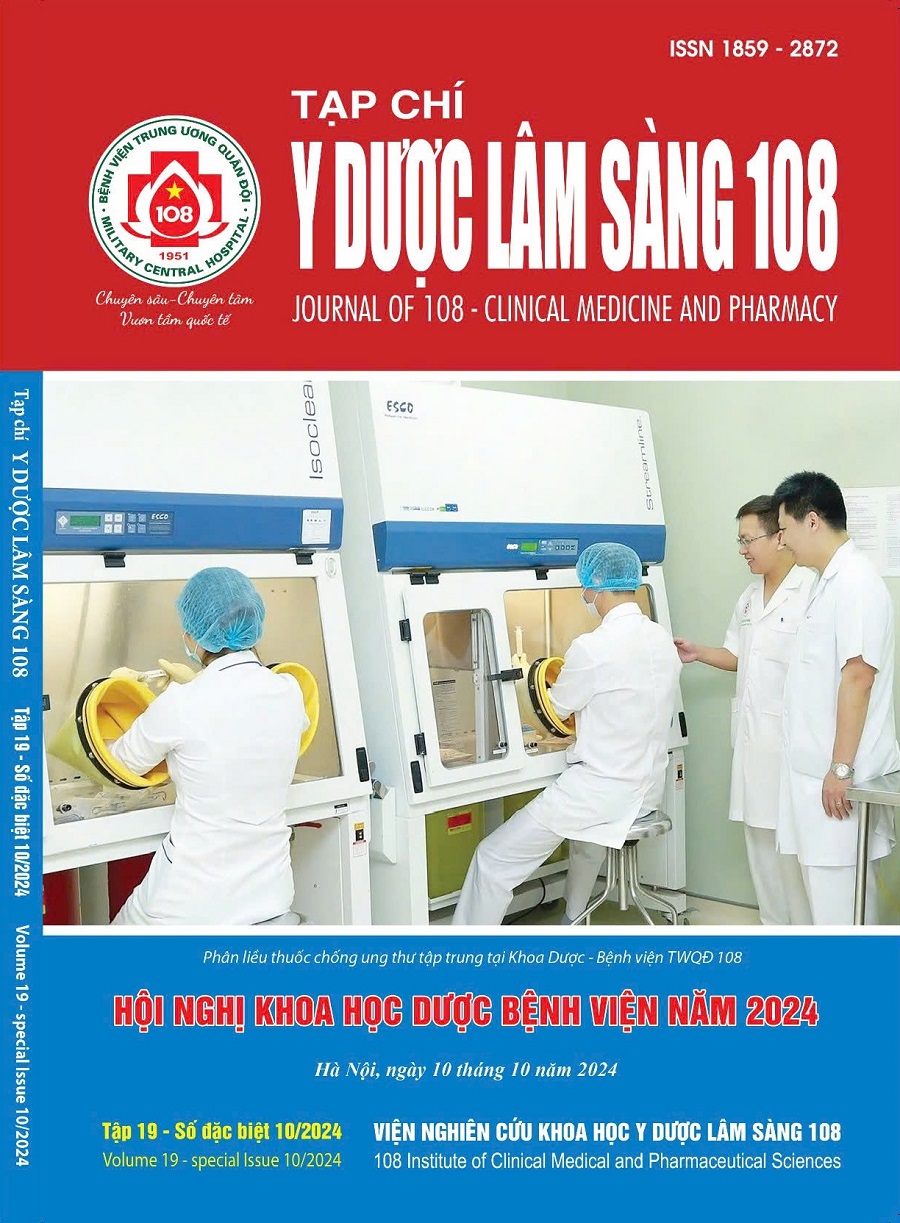Knowledge and medication adherence of oral anticoagulant-taking outpatients at 108 Military Central Hospital
Main Article Content
Keywords
Abstract
Objective: To evaluate medication knowledge and adherence in oral anticoagulant-taking outpatients. Subject and method: A cross-sectional descriptive study was conducted on 152 outpatients using vitamin K antagonists (VKA) or direct oral anticoagulants (DOAC) at 108 Military Central Hospital from December 2023 to February 2024. The study evaluated knowledge and adherence to anticoagulants by utilizing AKT and GMAS questionnaires, which had been already translated, validated, and culturally adapted in Vietnam. Result: The average age was 70.9 ± 8.1 years. Anticoagulation was indicated primarily (94.1%) in atrial fibrillation. The standardized knowledge score of the entire sample was 43.2%. The DOAC group had a better score of 44.1% compared to the VKA group with a score of 36.5%. Only 3.9% of patients were classified as having “Good” knowledge. Regarding adherence, a significant majority of patients (88.8%) demonstrated a “High” level of adherence to anticoagulant use. The rate in the DOAC group was 88.1%, which was lower than the rate in the VKA group at 94.1%. Conclusion: The study identified a deficiency in anticoagulant use knowledge among outpatients; nevertheless, adherence to anticoagulants was satisfactory. Efficient strategies are required to increase knowledge on anticoagulants, therefore leading to the optimization of anticoagulant therapy and enhancement of treatment quality.
Article Details
References
2. Ozaki AF, Choi AS, Le QT, Ko DT, Han JK, Park SS, et al (2020) Real-World Adherence and Persistence to Direct Oral Anticoagulants in Patients With Atrial Fibrillation: A Systematic Review and Meta-Analysis. Circulation Cardiovascular quality and outcomes 13(3): 005969.
3. Matalqah L (2013) Relationship between patients’ warfarin knowledge and anticoagulation control: results of a validated tool in Malaysia. Journal of pharmaceutical and biomedical sciences 30: 967-974.
4. Rolls CA, Obamiro KO, Chalmers L, Bereznicki LRE (2017) The relationship between knowledge, health literacy, and adherence among patients taking oral anticoagulants for stroke thromboprophylaxis in atrial fibrillation. Cardiovascular therapeutics 35(6).
5. Patsiou V, Samaras A, Kartas A, Moysidis DV, Papazoglou AS, Bekiaridou A, et al (2023) Prognostic implications of adherence to oral anticoagulants among patients with atrial fibrillation: Insights from MISOAC-AF trial. Journal of Cardiology 81(4): 390-396.
6. Ahmed H, Saddouh EA, Abugrin ME, Ali AMM, Elgdhafi EO, Khaled A, et al (2021) Association between Patients' Knowledge and Adherence to Anticoagulants, and Its Effect on Coagulation Control. Pharmacology 106(5-6): 265-274.
7. Borne RT, O’Donnell C, Turakhia MP, Varosy PD, Jackevicius CA, Marzec LN, et al (2017) Adherence and outcomes to direct oral anticoagulants among patients with atrial fibrillation: Findings from the veterans health administration. BMC Cardiovascular Disorders 17(1): 236.
8. Anticoagulation forum. Core Elements of Anticoagulation Stewardship Programs 2019.
9. Obamiro KO, Chalmers L, Bereznicki LR (2016) Development and Validation of an Oral Anticoagulation Knowledge Tool (AKT). PloS one 11(6): 0158071.
10. Phạm Thị Hồng Thắm, Châu Minh Nhật (2020) Dịch thuật và thẩm định độ tin cậy của bộ câu hỏi khảo sát kiến thức về sử dụng thuốc kháng đông. Tạp chí Y học TP Hồ Chí Minh tập 24, số 6, tr. 131-133.
11. Mbaye A, R Yassine AA Ngaide, M.C.B.O. Leye (2016) Knowledge of oral anticoagulation treatment by vitamin K antagonist: Survey among 100 patients in the Cardiology Department of Grand Yof general hospital of Dakar in Senegal. Angéiologie 68(3): 54.
12. Nguyen TH, Truong HV, Vi MT, Taxis K, Nguyen T, Nguyen KT (2021) Vietnamese Version of the General Medication Adherence Scale (GMAS): Translation, Adaptation, and Validation. Healthcare (Basel, Switzerland) 9(11).
13. Hoàng Nguyễn Kim Thoa (2023) Phân tích thực trạng kê đơn và kiến thức, hành vi sử dụng thuốc chống đông đường uống trên bệnh nhân ngoại trú tại Bệnh viện Tim Hà Nội. Luận văn Thạc sỹ Dược học. Đại học Dược Hà Nội.
14. Tran MH, Nguyen HH, Mai QK, Pham HT (2023) Knowledge and medication adherence of oral anticoagulant-taking patients in Vietnam. Research and practice in thrombosis and haemostasis 7(1): 100044.
15. Nguyễn Ngọc Quân, Đặng Việt Đức (2021) Thực trạng kiến thức sử dụng thuốc chống đông đường uống của người bệnh rung nhĩ không do bệnh van tim tại Bệnh viện Trung ương Quân đội 108. Khoa học Điều dưỡng 05(04).
16. Matalqah L (2013) Relationship between patients’ warfarin knowledge and anticoagulation control: results of a validated tool in Malaysia. Journal of pharmaceutical andbiomedical sciences 30(30): 967-974.
17. Deshpande CG, Kogut S, Willey C (2018)
Real-World Health Care Costs Based on Medication Adherence and Risk of Stroke and Bleeding in Patients Treated with Novel Anticoagulant Therapy. Journal of managed care & specialty pharmacy 24(5): 430-439.
 ISSN: 1859 - 2872
ISSN: 1859 - 2872
